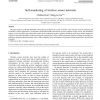Free Online Productivity Tools
i2Speak
i2Symbol
i2OCR
iTex2Img
iWeb2Print
iWeb2Shot
i2Type
iPdf2Split
iPdf2Merge
i2Bopomofo
i2Arabic
i2Style
i2Image
i2PDF
iLatex2Rtf
Sci2ools
COMCOM
2006
2006
Self-monitoring of wireless sensor networks
This paper presents an efficient distributed self-monitoring mechanism for a class of wireless sensor networks used for monitoring and surveillance. In these applications, it is important to monitor the health of the network of sensors itself for security reasons. This mechanism employs a novel two-phase timer scheme that exploits local coordination and active probing. Simulation results show that this method can achieve low false alarm probability without increasing the response delay. Under a stable environment analytical estimates are provided as a guideline in designing optimal parameter values. Under a changing, noisy environment a self-parameter tuning functionality is provided and examined. q 2005 Elsevier B.V. All rights reserved.
Related Content
| Added | 11 Dec 2010 |
| Updated | 11 Dec 2010 |
| Type | Journal |
| Year | 2006 |
| Where | COMCOM |
| Authors | Chih-fan Hsin, Mingyan Liu |
Comments (0)

